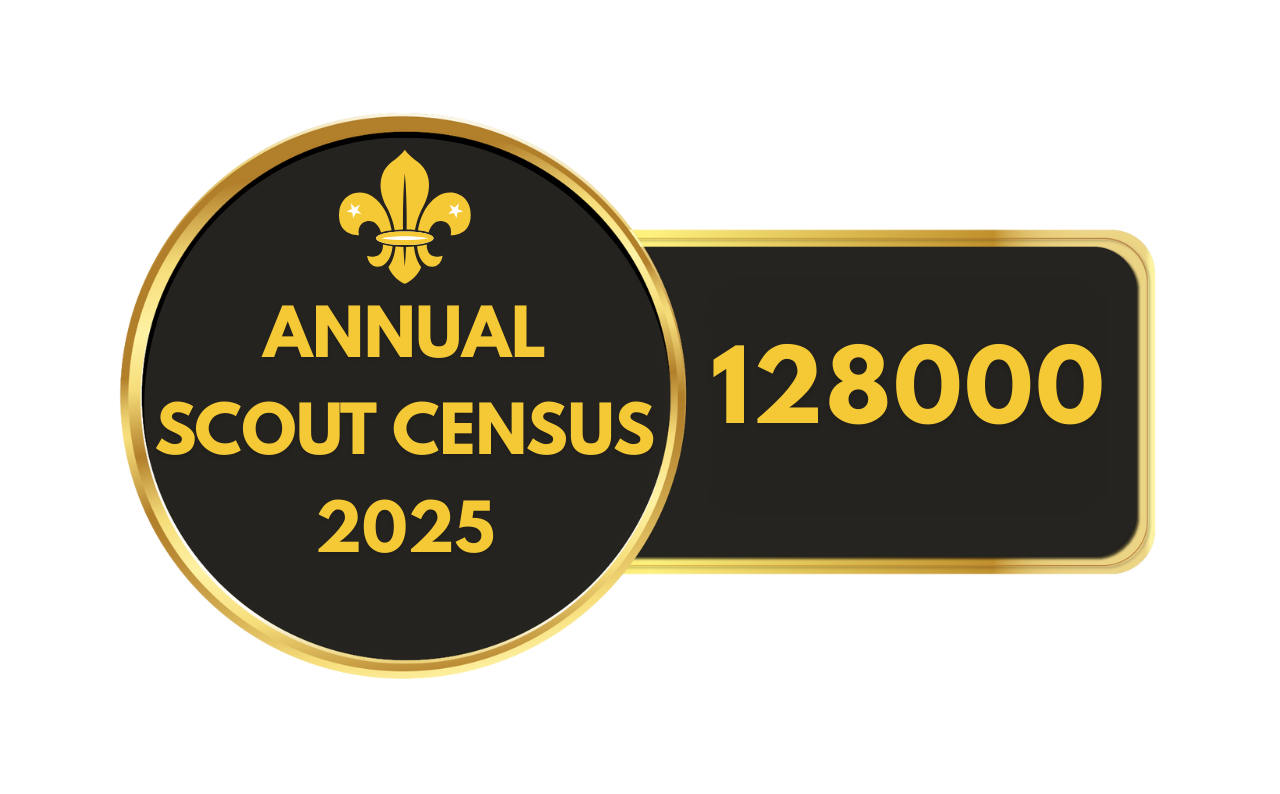Safe From Harm
- Home
- Safe From Harm
INTRODUCTION, SAFE FROM HARM – SRI LANKA SCOUT ASSOCIATION
Safe from Harm (SfH) is a systematic approach (strategies, guidelines and procedures) to prevent and react to situations that may affect the safety, wellbeing and development of children, young people and adults in Scouting.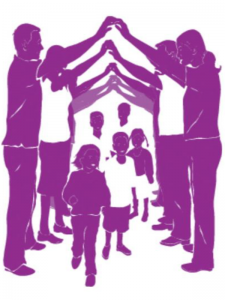
It involves all stakeholders who interact with Scouts and the Scout movement. It extends beyond Scouting hours into wellbeing, personal development, safety from both intended and unintended harm at all times. The Sri Lanka Scout Association’s (SLSA) SfH Policy, completely embraces the principles of Universality, Empowerment, Holistic development and Transversal Integration as specified by the WOSM’s Position Paper on Child and Youth Protection.
The concept of a safe environment for young people to live and grow, is mooted by numerous organisations across the world. The exact policies are not identical although collectively similar. The term Safe from harm has been used most famously in Scouting and The Salvation Army. Other organisations, have similar objectives described by other names. To mention few examples – National Society for the Prevention of Cruelty to Children, UK, uses “Safeguarding children and child protection”; Plan international (UK based) calls it “ Keeping Children and Young People Safe”; Ministry of Women & Child Affairs and Social Security, Sri Lanka uses “National Policy on Child Protection”. Even within the Scout world the terminology somewhat differs e.g.- UK Scouts have “Safeguarding in Scouting” and “Child Protection Policy”.
BACKGROUND
The first manifestations of child protection services with a legal mandate to intervene and to protect children from abuse and neglect emerged in the late 19th century. Thereafter, the concept grew and spread from USA and UK to the entire world. Here are some milestones –
- The Declaration of the Rights of the Child, sometimes known as the Geneva Declaration of the Rights of the Child, is an international document promoting child rights, adopted by the League of Nations in 1924.
- An extended form of this was adopted by the United Nations in 1959.
- The United Nations Convention on the Rights of the Child (UNCRC), a legally-binding international agreement that applies to every child was adapted in 1989. Article 19 provides for the protection of children in and out of home.
Sri Lanka Scout Association (SLSA) has had zero tolerance to abuse, maltreatment and harm to children and young people. The governing guidelines, rules and regulations SLSA followed, were as specified in the National Child Protection Policy (of the National Child Protection Authority = NCPA, Ministry of Child Development and Women`s Affairs, Sri Lanka) which is updated regularly.
For more than 100 years, Scouting took responsibility for safety of children and young adults and this was an important contribution for its worldwide success. Initially, unwritten laws and traditions with some references in written texts were responsible for Child safety. With a world trend towards documentation and binding commitment, Scouting’s Safety policy took shape. During the 2002, 36th World Scout Conference in Thessaloniki, Greece, the “Keeping Scouts Safe from Harm resolution” was adapted into Scouting. In 2016, “Keeping Scouts Safe from Harm – WOSM’s Position Paper on Child and Youth Protection” was introduced. From then on, National Scout Organisations (NSOs) around the world has been encouraged by WOSM, to write their own Safe from Harm Policy and Sri Lanka Scouts have committed to the worldwide trend. Today, WOSM considers a National Policy of SfH, a priority for the NSO.
DEFINITIONS
Harm
Harm refers to any detrimental effect, on a person’s physical, emotional or psychological wellbeing and integrity.
Abuse
Abuse is when one person hurts another person, either physically or emotionally. Abuse happens over time, usually in a cycle. It often continues until the person who is being abused gets help.
Important types of abuse are – 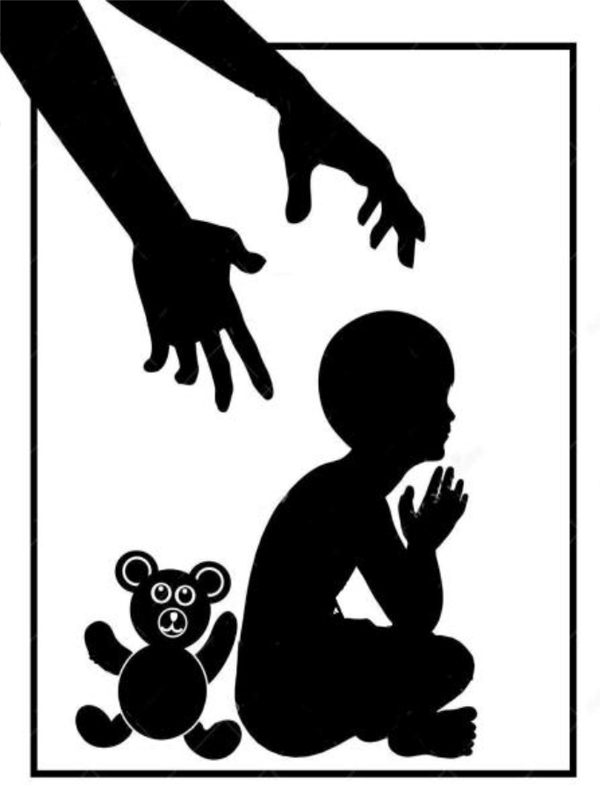
- Physical abuse.
- Emotional abuse (Aka: Verbal, Mental, or Psychological Abuse)
- Sexual abuse (Rape, molestation, child pornography production / possession)
- Neglect (Physical neglect, educational neglect, and emotional neglect)
- Bullying
- Exploitation
Adults in Scouting
Adults in Scouting refers to anyone over the age of 18 years involved in Scouting in a warranted or unwarranted capacity and includes Scout Leaders, Rovers, non uniform members, Officials, Support staff (e.g. – office employees), regulatory officers (e.g.- school Principals, Teachers) and other paid and volunteer helpers to the Scout movement. The word Adult members refers to Non uniformed members, warranted Adult Scout Leaders and Rovers. Young Adults refers to Scouts between 18 and 26 years.
Children in Scouting
Children in Scouting refers to any child or young person below the age of 18, involved in Scout activity whether an invested member or not.
FOR WHOM IS THIS POLICY WRITTEN
This policy is written for children and young adults between 5-26 years, Adults in Scouting, officials and all other stakeholders involved in Scouting. All Scout sections of Singithi, Cubs Scouts, Junior Scouts, Senior Scouts and Rover Scouts of the SLSA come under this policy. Adults in Scouting and other institutions and organisations (such as schools authorities, sponsoring bodies, Government officials) interacting with Scouts also should abide with the guidelines in this policy.
CONSTITUENTS OF SfH POLICY
The diagram below shows to what interactions the policy is written for and what situations it gives direction to.
SfH POLICY – BOTTOMLINE: IN SIMPLE ENGLISH
Every person in Scouting is responsible for protecting everybody, themselves included, creating safe surroundings and progressing as a person towards their own goals. In doing so, they should enjoy quality Scouting and protect the Scout organisation as well. Each person should to be able to identify any harm that they are about to face and be able to stop that harm from happening. They should know how to and whom to inform if any harm ever happened to them. Every person should be free to discuss any uncomfortable experience they had – even when they are not sure if it is good or bad. They should be able to easily find people to talk to and should find help in correcting the situation. This policy would make SLSA a very Child safe organisation.
THE PLAN, DO, REVIEW, REVISE CYCLE FOR SFH POLICY / SLSA
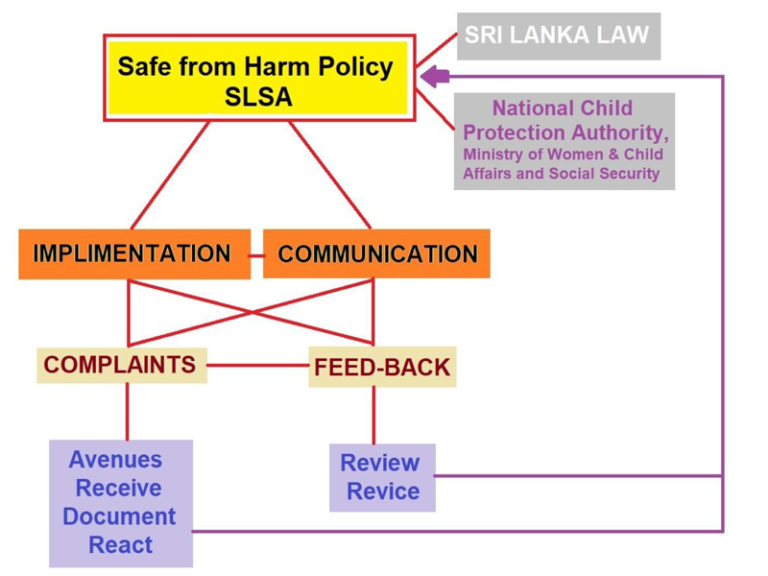
METHODS SLSA WILL USE TO EDUCATE AND TRAIN RECRUITS, SCOUTS, LEADERS, OFFICALS & SUPPORT STAFF ON SfH POLICY

1. The SfH Policy with a Training Manual will be available in the web as complete information and material for self study.
2. SfH policy will be dispersed throughout the SLSA as mandatory SfH training, to practicing leaders and officials.
3. A system will be in place to convey the existence of SfH Policy and where to access it, to every scout , new recruit and their parents / guardians.
4. Components of SfH policy will be incorporated to the National Scout Program – as appropriate to Singithi, Cub, Scout, Senior Scout, Rover Scout sections.
5. SfH policy will be included and formerly explained to the Adults in training, through the National Training Team – relevant areas will be introduced at progressive stages of training from Phase I to the LT course, as deemed fit by the NTC and his team.
6. Education on SfH Policy will be an ongoing process, updates will be introduced as part of The Plan, Do, Review, Revise Cycle for SfH Policy.
SLSA SAFE FROM HARM POLICY STATEMENT

Part I – Considerations on Relationships
Relationships between Young People
SLSA will be taking progressive steps necessary to introduce the concepts of how good relations among scouts themselves, will promote their own collective safety and that meaningful relationships are likely to lead to better personal all round development.
- A guide to friendship will be made available to encourage Scouts to build loving, secure and stable friendships.
- Leaders would be expected to promote brotherhood among Scouts and explain to them how such bonds could make their collective environment safer.
- The training team will specifically give ideas / examples of games, stunts, activities and other opportunities to build positive and meaningful relationships within scouts in a manner where new friendships begin and old friendships blossom.
- SLSA will lay out personal boundaries for children and young people for healthy relationships.
- SLSA will outline how to identify a threat, how to prevent it collectively, how to react when such a threat is taking place and whom to communicate with for guidance.
the SLSA will treat this whole area as an integral part of empowering scouts for their own safety .
References
https://www.scouter.com/topic/6753-fighting-at-summer-camp/
https://www.scout.org/youthinvolvement
Relationships between Young People and Adults
Adults working with children and Young people have a crucial role to play in shaping their lives and need to guide and inspire them, be a role model to them and to provide them a safe, responsive environment. SLSA will facilitate this under the following approaches: 
- Adult Leaders should safeguard children and young people from physical, emotional and psychological harm and promote their welfare.
- Adults should make sure the decisions they take are in the best interests of children and young people under their care.
- Adults in Scouting are responsible for their own actions and behaviour and accountable for the way in which they exercise authority; manage risk and use resources.
- Adults must always maintain a suitable professional boundary, should at all times avoid behaviour that might be misinterpreted by others and reduce the risk of Adults being unjustly accused of improper or unprofessional conduct.
- At all times, adults, should work and be seen to work, in an open and transparent way and there should not be any room for misinterpretations of intent, allegations of favoritism.
- Adults should be sensitive to differences expressed through culture, disability, gender, language, racial origin, religious belief and sexual identity and never discriminate on these accounts.
- Adults should actively look for any form of physical, mental or emotional grievance in their charges, actively enquire and investigate them and correct the situation themselves or forward the issue to the relevant authority for remedial action if necessary. They should maintain a confidential brief reports on their observations and actions for examination if necessary.
- Adults may have a possibility of having access to confidential information about children and young people. Such information should only be disclosed to relevant personnel, when it is essential for the betterment of the individual concerned or society at large.
- Adults should dress appropriately and maintain their personal decorum at all times.
- When camping or spending nights out, event organisers should ensure that there are separate allocated sleeping / resting areas for adults. Further, it is appropriate to give separate spaces for Scouts of various age categories.
References –
https://scoutmastercg.com/handling-physical-fights-between-scouts/
http://www.healthscotland.scot/media/2325/the-relationship-between-a-trusted-adult-and-adolescenthealth-outcomes_6588.pdf
Relationships between Adults
It is the responsibility of the SLSA to create the most appropriate conditions for adults to be able to play their role, either as volunteers or professional staff. Implementing SLSA SfH Policy for Adults would include –
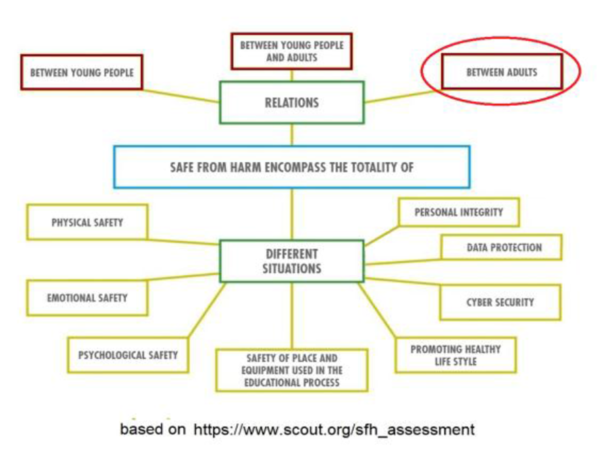
- All adults need to be listened to, taken care of and supported so that they can carry out their role at their best at all times.
- SLSA shall provide a written guide, driven by sociological principles, to encourage friendship/brotherhood, promote healthy and positive collaboration and relationships between adults. This would also concentrate on prevention of Psychological harm, Emotional harm and Physical harm (actual or implied).
- SLSA shall maintain standards in adult recruitment, selection and induction processes align with the SfH Policy and the Strategic Plan. Such appointments will be subjected to suitable background checks, references, personal statements and interviews at all levels.
- SLSA shall encompass a set of guidelines for all adults which includes a code of conduct, Whistle-blowing Policy, Bullying and Harassment Policy.
References –
https://www.managementstudyguide.com/types-of-interpersonal-relationships.htm
https://www.wikihow.com/Be-a-Good-Friend & https://www.wikihow.com/Be-Friends-with-Everyone
https://personalexcellence.co/blog/new-friends/
https://www.tameside.gov.uk/ChildProtection/Guidance-for-adults-who-work-with-children-and-(2)
https://www.scout.org/sites/default/files/media-files/WorldAdultsinScoutingPolicy_review2.4_final.pdf
Part II – Considerations on Different Situations
Different Situations 1 – Physical Safety
Physical safety is of utmost importance for the life of children and young people. While promoting physical activity, SLSA will try to in inspire and place a strong culture of safety. The following areas are considered –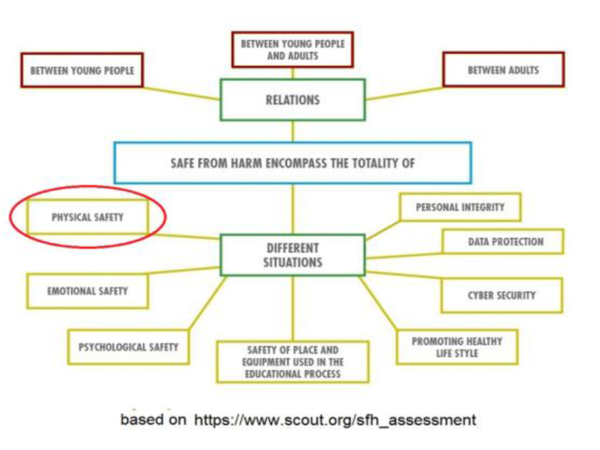
- Zero tolerance to physical abuse of any magnitude, whether real or implied, will be established as the norm.
- Sexual abuse as a subject, will be introduced to children and young adults – there is an excellent educational poster called “Good touch Bad Touch” by the NCPA. Educational material such as this will be made available to Scouts after discussion with appropriate authorities.
http://www.childprotection.gov.lk/leaflets/Good%20Touch%20-%20Bad%20Touch%20(English%20leflet.pdf - Adolescents have issues with their growing and changing bodies. SLSA hope to direct leaders to be sensitive to these issue, understand and offer help.
- SLSA will encourage leaders and Scouts to always be mindful of their environment, assess risks and identify physical threats that can harm them (e.g.- broken roof in school). They should report such matters to appropriate authorities and ensure proper action is taken.
- SLSA will focus on areas such as injury prevention during physical activity where adequately conditioned children with safe skills need to interact with a safe environment and safe equipment. Wearing appropriate safety gear, concept of drinking adequate safe water, warming up, knowing your limits and recognizing an injury will be covered in the guidelines.
- SLSA will encourage a culture where risky behavior that endangers self and others is neither encouraged nor tolerated. Scouts & Leaders will be given direction on how to identify and remedy such instances.
References –
https://safesupportivelearning.ed.gov/topic-research/safety/physical-safety
https://raisingchildren.net.au/school-age/nutrition-fitness/physical-activity/activity-injury-prevention
https://tvtropes.org/pmwiki/pmwiki.php/Main/TalkingYourWayOut
Different Situations 2 – Emotional Safety
In Psychology, Emotional safety refers to a very specific emotional state achieved in attachment relationships (intimate relationships / love affairs) wherein each individual is open and vulnerable.
When a relationship is emotionally safe, the partners trust each other and routinely give each other the benefit of the doubt in questionable situations. If each perceives the other partner to be securely attached and each holds the other in high regard, they feel emotionally safe. When emotional safety is lost, the partners are inclined to be distrustful, looking for possible hidden meanings and potential threats in each other’s words and behaviors.
SLSA will introduce the concept of the “emotional safety model” and the related “couple’s conundrum” in the simplest of terms and explain to young people in Scouting how to build and enhance Emotional Safety and reap the fruits of a very enjoyable attachment relationship.
References –
https://en.wikipedia.org/wiki/Emotional_safety
https://psiloveyou.xyz/how-to-create-emotional-safety-in-your-relationships-d8331eab4b9f
https://psychcentral.com/blog/what-it-means-to-be-emotionally-safe-in-a-relationship/
Different Situations 3 – Psychological Safety
There are many definitions of Psychological Safety. A recent simple definition states, It is “a condition in which you feel – included, safe to learn, safe to contribute, and safe to challenge the status quo – all without fear of being embarrassed, marginalized or punished in some way (Timothy R Clark, 2019). It is about removing fear from human interaction and replacing it with respect and permission. 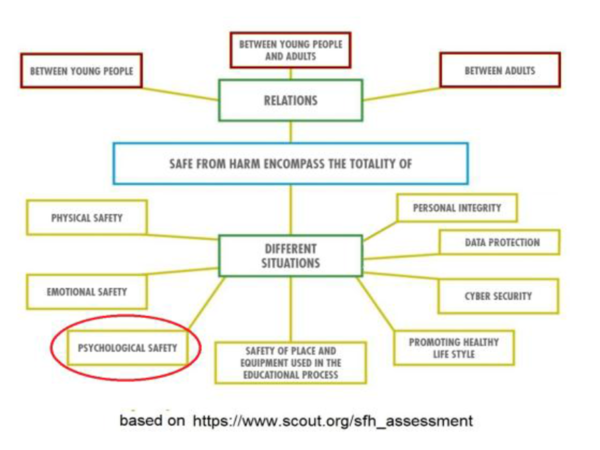
SLSA will increase Psychological safety by –
- Promoting members to be themselves.
- To express mutual respect, trust and show interest in each other as people
- To freely collaborate with each other without barriers.
- Encouraging Scouts and Leaders in good handling of mistakes / failures / critical incidents.
- Listening to everyone’s input.
- To be appreciative.
- Share without considering gender or rank.
- To be protective of others.
References –
https://en.wikipedia.org/wiki/Psychological_safety
https://medium.com/@Harri_Kaloudis/psychological-safety-at-work-what-do-psychologically-safe-workteams-look-like-5585ab0f2df4
Different Situations 4 – Safety of Place and Equipment used in the Educational Process
SLSA will bring about Safety of Place and Equipment by 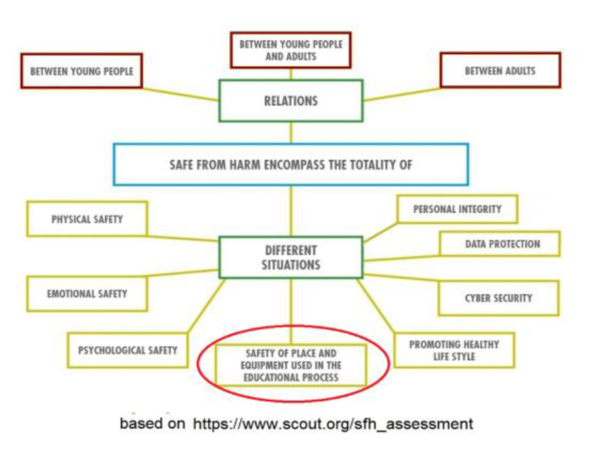
- Emphasising the importance of identifying safe places for all Scout activities. A proper risk assessment tool will be available to them and leaders and officials would be guided to formally assess risks.
- Requiring assessing a natural environment to be separate entity, as the threats from heights, water, wild animals and terrain become unique in these setting.
- Educating how to keep away from dangerous social encounters and how to exercise an effective defensive dialog to de-escalate a potential fist-fight.
- Encouraging the use of appropriate safety equipment and deliver a basic knowledge of proper use of common safety equipment in use at places where Scouts may commonly work.
- Teaching Scouts and Leaders, safe habits to prevent home accidents.
- Training Scouts the proper maintenance and appropriate storage of materials used. They will be encouraged to maintain an inventory and maintain service records.
- Encouraging Troops / Groups to keep a log or reporting book to enter all events, be it a success or not.
References –
https://members.scouts.org.uk/supportresources/2360/planning-and-assessing-risk?cat=299,301&moduleID=10
https://members.scouts.org.uk/factsheets/FS120000.pdf
https://www.scouting.org/health-and-safety/safety-moments/risk-assessment/
https://tvtropes.org/pmwiki/pmwiki.php/Main/TalkingYourWayOut
Safety checklist for leaders –
https://members.scouts.org.uk/documents/safety/Safety%20Checklist%20for%20Leaders%20-%20Feb%202017.pdf
Different Situations 5 – Promoting Healthy Lifestyle
SLSA will ensure that Scouts leaders and officials will understand and follow 
- What is Health
- What is Healthy Living
- Components responsible for promoting healthy living, specifically the importance of
- A healthy diet
- Eating correct portions & ways to integrate these into the Scout movement
- Water, its body functions and how much water one should drink daily
- Sleep, its importance and how much sleep is recommended for healthy living
- Being Physically active, what it means and the WHO recommendations
- Maintaining correct weight, its importance and concepts of overweight and Obesity
- Avoiding Alcohol, the harmful effects of Alcohol, Chronic Alcoholism its dangers and how to seek help for an affected individual
- Not Smoking, dangers of smoking, magnitude of the smoking problem, how it kills and how to help a smoker to quit
- Keeping away from Substance Abuse – substances abused, its danger, medical and social implications and available help for a drug addict
- Managing Stress & Worrying less – what is stress, what it does to the body, how can you manage stress and worry less
References –
https://www.ncbi.nlm.nih.gov/pmc/articles/PMC2080455/
https://www.who.int/behealthy/healthy-diet
https://www.who.int/en/news-room/fact-sheets/detail/healthy-diet https://www.medicalnewstoday.com/articles/290814
https://www.healthline.com/nutrition/how-much-water-should-you-drink-per-day
https://www.healthline.com/nutrition/10-reasons-why-good-sleep-is-important
https://www.who.int/behealthy/physical-activity
https://www.who.int/health-topics/physical-activity
https://www.who.int/en/news-room/fact-sheets/detail/obesity-and-overweight
https://www.who.int/news-room/fact-sheets/detail/alcohol
Different Situations 6 – Cyber Security
We live in times, when the internet is exposing impressionable children and teens, on everything from gaming to death defying stunts. 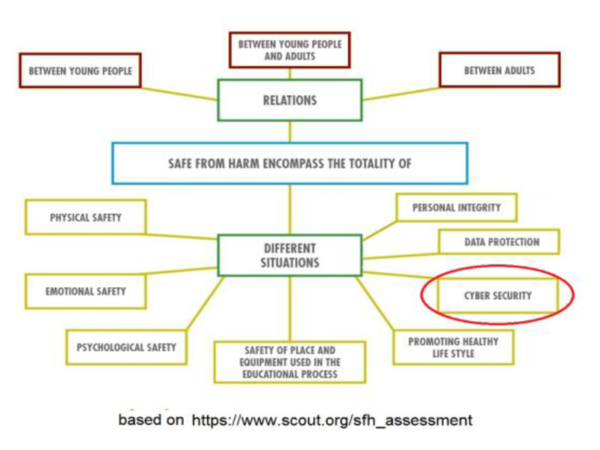
Keeping Scouts safe online, has become more important than ever since they are spending progressively more time using digital media for education, research, socializing, and entertainment.
To ensure cyber security, of all surfing activities of children, young people and adults, SLSA will take following steps –
- Ensure that all online platforms under SLSA control shall operate as safe environments. They will require to deliver contents which are suitable for Scouts.
- Teach children, young people and adults in Scouting, the broad principles of Internet safety.
- Introduce guidelines to parents, scouts and leaders how to keep Scouts safe from online child / teenage sexual exploitation.
- Provide guidelines on how to safely use information and communication technologies, particularly those that are internet-based. This training will emphasize safety from sexual overtones, avoiding religious / cultural controversies and avoid degrading material.
- Provide guidelines on identifying and protecting children and young people from Cyber Bullying.
- Recently, there has been an alarming number of serious injuries and deaths based on games and challenges made popular on social media and the internet. Examples of such games and challenges are – Fire Fairy, Blue Whale Challenge, Cinnamon challenge, Choking Game, Tide Pod Challenge, Five finger fillet, The Cutting Challenge and The Salt and Ice Challenge. SLSA will provide links to identify these games, how best to keep young people safe from them and how to counteract such entities.
- Provide best practice information about dealing with Cyber Stalking.
References –
11 dangerous games on the internet that could kill or seriously injure
https://gulfnews.com/lifestyle/11-dangerous-games-on-the-internet-that-could-kill-or-seriously-injure-1.2252866
The Cyber Helpline – Dealing with cyber stalking https://www.thecyberhelpline.com/guides/cyber-stalking
Different Situations 7 – Data Protection
SLSA does not have data protection regulations of its own and we are bound by Data Protection Legislation finalized recently by Ministry of Digital Infrastructure and Information Technology, Sri Lanka – a short account of which can be accessed at
http://www.mdiit.gov.lk/index.php/en/digitalnews/item/73-data-protection-legislation.
 UK Scout has a specific legally binding adaptation of the General Data Protection Regulation of the European Union, which can be accessed at
UK Scout has a specific legally binding adaptation of the General Data Protection Regulation of the European Union, which can be accessed at
https://members.scouts.org.uk/supportresources/search/?cat=55,888 .
WOSM privacy statement specifies its data protection stance at https://www.scout.org/privacy and the Data Privacy Policy can be viewed at https://media.scout.org/privacy
Data considered confidential today, such as religious views, political views, criminal convictions, sexual orientation and membership of prohibited / proscribed organizations, are not collected by SLSA.
However, three instances on Data Protection are of impotence to SLSA and are dealt with below –
- Intellectual property theft (IP theft) refers to the robbing of people or companies of their ideas, inventions, and creative expressions. The World Intellectual Property Organization, defines IP as “creations of the mind,” such as inventions, literary and artistic works, symbols, names, images and designs used in commerce and can include everything from proprietary products and parts, to movies, music, web content, project ides, and software. The SLSA condemn IP theft, will educate its members of its existence and teach specific ways to identify and prevent IP Theft.
- The SLSA website is currently operated on an open forum basis. One can access any information without registration. We hope to make certain areas of the website only viewable after appropriate registration. This will allow some gating of knowledge dispersion.
- SLSA shall take all necessary actions to protect personal data relevant to any complaints, enquiries etc. Ensure the confidentiality of the persons involved. These will not be disclosed to any 3rd party without having a valid justification.
References –
Intellectual Property (IP) Theft https://awakesecurity.com/glossary/intellectual-property-theft/ Intellectual Property Theft/Piracy https://www.fbi.gov/investigate/white-collar-crime/piracy-ip-theft
Different Situations 8 – Personal Integrity
Personal Integrity is the quality of being truthful and honest with yourself and others. Put another way, integrity is doing what you believe to be right, irrespective of the costs, downside, hardships involved.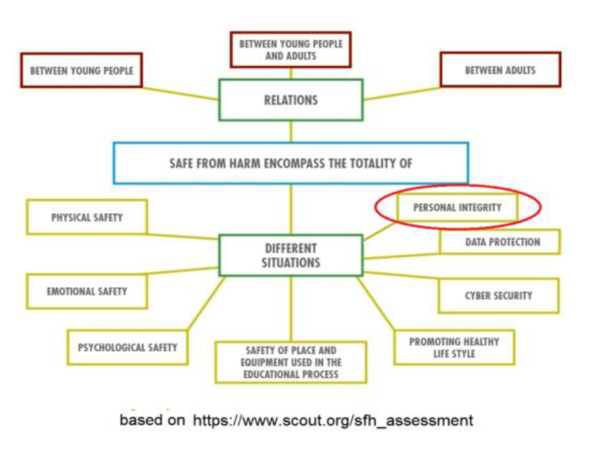
SLSA will ensure that Scouts, leaders and officials will understand
- What is Integrity and what is Personal Integrity.
- The importance of Personal Integrity for personal development – how to be the best you
- Some guideline for Practicing Personal Integrity.
- How to develop and enhance personal Integrity.
References –
https://www.steverrobbins.com/articles/what-is-personal-integrity/
https://steppingstonestofi.com/personal-integrity/
https://flowchainsensei.wordpress.com/2012/10/21/a-beginners-guide-to-personal-integrity/
https://ascensionglossary.com/index.php/Personal_Integrity
SUMMARY STATEMENT ON SLSA SfH POLICY - IMPLIMENTATION, TRAINING, COMMUNICATION, COMPLIANTS, REVIEW AND RIVISION
(Details and Action Plans of the bullet points below will be expanded in Phase II of process of adapting SfH Policy / SLSA)
- SLSA has promoted and prioritised the safety, wellbeing and development of children and young people according to its SfH Policy Statement.
- Minimal accepted national standards will be set for the extent of imparting and implementation of the SfH policy.
- SLSA will provide all children and young people within the movement and newly joining the organisation, with information for themselves and their parents / guardians about the SLSA SfH Policy and how to access it.
- Will make available a full version of the SLSA SfH Policy, together with a Training Manual in the official website which could be accessed by all and easily downloadable.
- All scouts, their guardians, leaders, adults, and other stakeholders will be provided with appropriate mandatory training / learning opportunities to understand the SfH policy / SLSA.
- Scouts, leaders and other stakeholders will be provided opportunities to clear any doubt about their roles and responsibilities in respect to safeguarding children and young people in accordance of the SfH policy of SLSA.
- Will empower and motivate children and young people at each level, to live their role and address their own needs to safeguard themselves from harm, to promote their wellbeing and to grow to reach their full potential.
- SLSA will implement best practice safe recruitment principles for Adults, leaders and officials working with children and young people. Prevent recruiting of unsuitable individuals through extensive use of self disclosure, background checks, recommendations and develop an effective barring mechanism.
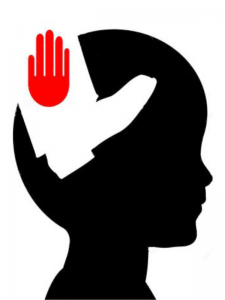
- Will encourage, leaders and other officials (Within Scout Groups) to disseminate progressively more information about the SfH Policy with the progress of each individual Scout.
- Adults in Scouting will be trained to recognise, identify and respond to signs of abuse, neglect and other safeguarding concerns relating to children and young people.
- SLSA will establish a well defined mechanism for making complains with accessible avenues to communicate and alternate pathways to lodge a complaint.
- SLSA will promote a culture of lending a sympathetic listening ear, to believe and support with compassion and make it possible for believing complaints among Youth / Adult leaders and Officials and ensure that they take seriously all concerns and allegations of abuse and respond appropriately and adequately.
- The Association will enquire to each complaint received and document accurately using all norms of sensitivity and complete confidentiality; examine the evidence in a fair and just manner and react in an appropriate, fair and adequate manner within the principles of Scouting and the law of the land.
- The Association will liaise with other organisations such as the National Child Protection Authority and complement our own National policies, guidelines and procedures.
- SLSA will widely promote the SfH policy within the community, youth groups and the society at large.
- The core drafting committee will ensure that robust reviewing process and a sound feedback assessment procedures are in operation. They will ensure that the policy is kept updated according to reviews, feedback, government regulations, needs of the movement and the society at large.
- Initially, this policy will be reviewed annually within the core committee together with CC/NPC/NTC/ Singithi, Cub, Rover & Girl Commissioners. After 2-3 cycles, the review period will be every 3 years.
- This policy may also be reviewed amended or changed in the following circumstances:
- Legislative changes
- Guidance by a government authority
- Recommendations of a special committee of enquiry
- Request of the SLSA with ratification by a significant number of responsible officers
- SLSA will without delay, investigate and recommend appropriate remedial action for any failure to comply with this policy.
References –
https://www.scout.org/sites/default/files/library_files/SafefromHarmWorldPolicy_2017_EN_0.pdf
https://aifs.gov.au/cfca/publications/history-child-protection-services
National Child Protection Authority > Resources Child Related Acts / Laws / Guidelines / Studies http://www.childprotection.gov.lk/?page_id=2211
https://learning.nspcc.org.uk/safeguarding-child-protection
https://www.scouts.org.uk/por/2-key-policies/the-child-protection-policy/

